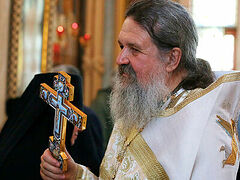On October 21, 2016, the Holy Synod of the Russian Orthodox Church canonized St. Arsenia of Ust-Medvedits as a locally venerated saint of the Volgograd Metropolis.
Abbess Arsenia (1833-1905) came from a notable family of the Don region. At the age of seventeen, Anna Mikhailova entered the Ust-Medvedits Monastery of her own accord. The monastery reached its highest peak in the forty years of her abbacy, from 1864 until her repose on August 3, 1905.
Besides her educational and charitable activities, the main fruits of Venerable Arsenia’s labors were the Kazan Cathedral, which was erected from 1785 to 1885, and the famous caves, dug in the image of the Kiev Caves. Today the monastery’s main shrine is there—the miraculous stone slab with hand and knee imprints of people kneeling in prayer, where the faithful come to beseech St. Arsenia for healings, the good arrangement of worldly affairs, and prosperous family lives.
In addition to her holy life, St. Arsenia left us valuable writings on the spiritual life, which we present in honor of the anniversary of her canonization.
If you don’t give any rest to your body, and in spite of of fatigue you force yourself to pray, to collect your thoughts, or search for a repentant feeling in your heart, then you’ll never have peace of mind; on the contrary, you’ll always be confused in your thoughts and burdened in spirit. St. Basil the Great says, “If rest harms a young and healthy body, then excessive work brings incomparably more harm to a sick and weak body.” There is no need to be embarrassed to give ourselves a little more rest, to have a few hours or at least minutes of a lively spirit, fresh feelings, and clear thoughts. Otherwise, you may reach a state of confusion. The Lord needs so little from us: only a humble spirit, and He gives us everything by His grace. When the Lord gives the soul the joy of His salvation, it will understand that it found Him where it lost itself; and it sensed a feeling of salvation there where it tasted the bitterness of death; it glorified the Lord Who was saving it there when all its tricks to save itself turned out to be false… Lord, You are the salvation of my soul!
The soul has no power at any time to overcome either passions or thoughts about the passions; the Lord overcomes them by the power of His grace.
The only correct activity of the soul living by the rivers of Babylon is to sit and weep (cf. Ps. 136:1).
The soil of my heart will constantly give birth to the weeds of the passions. They are uprooted with difficulty, with constant vigilance over the heart; the will resolves, seeing them with the mind, acting on them in the name of the Lord Jesus Christ.
Our infirmities won’t destroy us, but unbelief can destroy us—may the Lord deliver us from this by His mercy.
We have to know our measure; we have to stick to the word that is proper to our measure—the measure of unregenerate man. In the sweat of thy face shalt thou eat bread (Gen. 3:19). And is it fitting for us to dream of spiritual visions when we haven’t even begun to sweat from working to acquire our daily bread, when the soil of our heart constantly gives forth weeds and thorns? Lord! Have mercy on us by Your great mercy!
Egotism seizes everything for itself everywhere, not wanting to give anything up to its neighbor. And how can the soul love its neighbor when it senses that he has seized everything from it, as if having the same rights to everything? So it sees him as its enemy and hates him. You have to take everything away from yourself to give up everything to your neighbor, and then, the soul–along with its neighbor–will find the Lord.
The soul is given love that bears all after it’s cleansed not only from attachments, but also from passions. Our work is to recognize them within ourselves and to labor to cut them off. But we wouldn’t be able to see them within ourselves if the Lord didn’t reveal them to us, out of His love for mankind sending such circumstances that uncover them within us. Passion is known in the soul when a tormenting, oppressing burden is felt in the heart, disturbing spiritual thoughts and causing despondency. Until the soul has felt freedom, until it has tasted of peace and love, don’t think or say that your attachment has been destroyed. It’s only been embittered and has taken on a different form—and in this form it’s become possible to recognize it. When it’s sweet, it’s difficult to recognize, but when it’s bitter, then it’s easy.
We must be patient in our labors, and be patient some more, then some more; so that the purpose of patience is labor, so the purpose of labor is endurance in patience. Labor should not go beyond this and patience should not stop short of this. But without the Lord, the soul won’t achieve either of these, and again, it labors and endures with weakness and self-reproach.
We have to work lawfully and with all our might so that not only the spirit works, restraining the impulses of the mind with patience and all the impulses of the heart with humility, but so that the soul might always know the One Lord in all things.
There is a path of repentance, and therefore there are different degrees, transitions, improvements on this path. We mustn’t arbitrarily jump higher while still on the lowest step, seeking what’s on the highest.
The ego acts in everything; it tries to fix all difficult circumstances by itself, it , justifies itself, tries to rectify itself, and wrenches the soul in an untimely manner from the state where it circumstances permitted by the Lord has placed it, where it could have learned self-reproach, humility, and self-denial if only it would have endured and waited as it should.
Nothing can be more useful for a man than to know his own limitations. Then he will relate to everything correctly and won’t be on the wrong path. And for this, it’s invaluable to have a guide who can accurately indicate the state and limitations of the one he’s leading.
As long as we walk in the flesh, we will see our neighbor as our debtor: We demand from him both lawful justice and the holiness of grace as mankind’s common inheritance. We judge and hate him, persecute and torment him when he doesn’t give us our due. But when we’re led by the Spirit, when the Spirit of God pours out all the riches of His grace into our spirit, then we look for nothing from our neighbor; we forgive his debt, and even cease to see him as our debtor.
Silence cleanses the mind of thoughts. The awareness of our sinfulness, of our irrationality, our impotence, our insufficiency in everything leads the soul to the faith of reason. The rejection of our desires in everything leads to an active faith expressed in great simplicity and humility. The first leads to purity of mind, and the second to purity of heart.
The soul has a natural desire for good. I call this aspiration the calling of God, which it works so strongly in some souls that nothing earthly can satisfy it.
The frequent remembrance of death leads to the fear of God; it’s a frequent reminder that you’re living perhaps your last day, your last minute. And the grace of God plants it in the heart. “Plant Thy fear, O Lord, in the heart of Thy servants,” the holy Church prays.
The path of salvation is harsh, and sometimes the words spoken about it are harsh—they’re a double-edged sword cutting off our passions, our sensuality, causing pain in the very heart from which they’re excised. And will there be time for this sword to do everything it needs to in our heart? No, it will always have more work; there is no end to spiritual purification, and in every heart will be found that particle of impurity that needs to be cleansed.
The power of truth is a living force; communicating with souls, it forms them into one image. May the Lord strengthen us all, and may He help us abide in the Truth, which is Him Himself; and the path to Him is in us through our weakness, through the fullness of our sinfulness. Yes, this is not a false path, not invented, not concocted; the Lord Himself said not to look for Him anywhere, not in any states—for He Himself would appear. And He truly appears, bringing peace, strength, light to the perishing, weak, darkened soul. When we chase after states, we’ll catch only an illusion.
When infirmity reaches its extreme limits in our soul, so that there’s no hope left for any work, any reasoning, then at that moment, and only at that moment, the special help of God is spiritually felt, or rather, the knowledge of Him and the power of His actions in the soul.
The Lord sends us sorrows on earth, and these sorrows tear us away from the earth, or rather, from excessive attachment to all things earthly. That means sorrows are also a gift from God.
With a true understanding of himself, man will inevitably come to the Lord. But if he seeks Him within himself, that is, in his virtues, labors, and the like, he won’t find Him—the only One Who saves—but he will find himself. And this happens not only generally, but even in individual deviations in the work of the ego.
All the gifts of God—salvation and mercy for the soul—we receive through the Lord Jesus, the one Mediator between God and man, and therefore we call upon Him with faith, without comprehending Him, without reasoning. Rejecting the self and having faith lead the soul into simplicity and establish in the soul the unshakeable understanding of its insignificance, which remains constant, irrespective of God’s grace manifested to the soul in the realm of thoughts during attentive and fervent prayer, or when the soul is cold, scattered, inattentive, or even distracted. It's strange that in this or that state, the thought, once established in the soul, remains the same and unshaken, even though the state of the soul changes. And this steadfastness creates, as it were, a sense of constancy in the spirit, not becoming exalted during good states and not becoming downcast during bad ones. In either state, man is the same—a sinner in need of the Lord’s mercy. Excessive attention to one’s states can turn activity to the realm of the senses and not the spirit, since variability occurs more in them, which is inherent in them. Hence, one should not pay much attention either to the thoughts or the feelings. One thing you need to know is that they are sinful and impure and cannot be otherwise, because they come from an unclean mind and heart, and nothing better can be expected within ourselves; our purity,salvation, purification, and illumination are the one Lord. He is unchangeable, unshakeable, immutable. From this twofold faith—in our sinfulness and in the immutability of God—a believer’s spirit also becomes unshakable.
When the spirit is properly aligned, prayer becomes its breath, essential and rightly performed. And quietness of thoughts and peace of the senses are given by the Lord to the soul that adhered to Him by faith and prayer; no one can take or establish this in his own soul, and there’s no need to make great efforts to obtain it.
The desire and striving for salvation is the sole activity of the human spirit that is necessary in the work of salvation. It doesn’t save a man, but it is a necessary condition for salvation. It is preceded by the calling of God and confirmed by the power of God, but still this desire, feeble though it may be (as all things human), comes from man.
In their spiritual instructions, the Holy Fathers often exhort us to ask the Lord for wisdom if we don’t have it; for strength when we’re weak; for patience if we’re exhausted in sorrows; and in general, to ask Him for all good things.
The Divine Teacher said to His disciples: Now ye are clean through the word which I have spoken unto you (Jn. 15:3). And every true concept that has His Divine word as its foundation has the same power in part. The truth, accepted by faith, cleanses from the delusions the soul was in and lived by. It’s very dangerous to enter intensely into any kind of spiritual work. It’s impossible to enter into the understanding of some spiritual concept by strenuous effort. In order to fully, or even somewhat correctly understand the spirit of a man, you have to see him and speak with him—it’s impossible to make an accurate determination based on what someone else says.
If there’s something good, it’s impossible not to see it, not to recognize it as a good, but it can and should be attributed to the Lord, which will reveal a new reason for the soul to be humbled and to have reverence before the One Holy One and Savior. Praise, at times merely pleasant on a human level and indulgent to the self, can be useful as a means to rouse the despondent soul.
On preserving purity
To preserve bodily purity, we must preserve purity of the heart and mind. So we need prayer, we need attention to our heart, we need to work on ourselves. If we can’t always preserve warmth, since it’s a gift from God, then we can always strengthen within ourselves the determination of will to labor against the passions; we can kindle in ourselves the desire for perfection; we can force ourselves to struggle to keep God’s commandments, which were not given to us to arbitrarily fulfill whether we want to or not; no, we’re obliged to fulfill them, otherwise we will perish eternally. I urge you: For God, for the fulfillment of His most holy will, force yourself to bear the shortcomings of your neighbors; but be strict and demanding with yourself, with your shortcomings. It would be good for you to sometimes read the lives of the saints and have at least a small but constant prayer rule.






